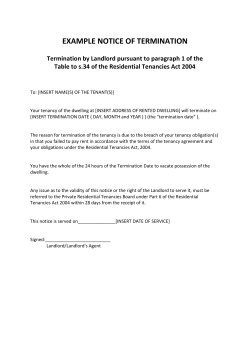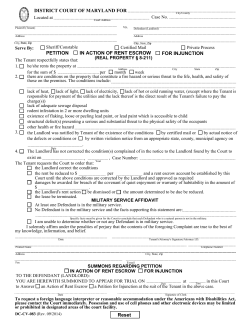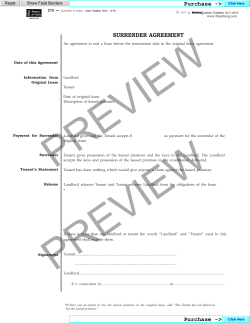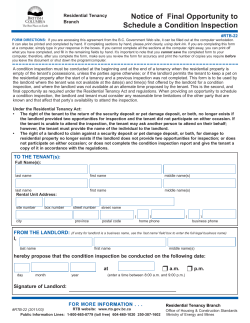
LandLord & Tenant Tips / Info - Cullinan Property Management
AN INITIATIVE OF THE JUSTICE PORTFOLIO Tenant or landlord? As a tenant or landlord, you have rights but you also have responsibilities. As a tenant The lease A tenancy agreement can be either verbal or written. The agreement should cover when, where and how the rent is to be paid. Always get a receipt for any cash payments you make. Don’t sign a lease if you don’t understand part of it. It’s a legally binding contract. If you want to move out before the end of the lease, you may be liable for advertising costs, re-letting fees and even rent until a new tenant is found. When you sign a residential tenancy agreement, the landlord must give you a signed copy of the agreement and an information brochure on the Residential Tenancies Act 1995. Moving in The day you move in, the landlord must fill in an inspection sheet and give you two copies. Once you’ve checked its accuracy, you must sign both reports and return one copy to the landlord. If something is dirty or broken, make sure you note it on the report before returning it. Always keep a copy. You may be asked to pay a security bond which is usually equal to four weeks’ rent. The landlord must lodge the bond within seven days with the Office of Consumer and Business Affairs and give you a receipt within 48 hours. At the end of your tenancy, provided there is no damage, rent owed or other liability and you have handed over the keys, the bond should be refunded to you. It’s the landlord’s responsibility to provide the home in a reasonable state of repair, having regard to the age of the premises. It’s your responsibility to keep the premises clean. Alterations and repairs You must get the landlord’s permission to make any renovations, alterations or additions. The landlord is responsible for arranging any repairs. If something needs to be repaired, you should report it immediately. The landlord should arrange a mutually agreeable time with you for repairs to be made. Otherwise, the landlord can choose the time and give you 48 hours prior written notice in order to carry out repairs. There also are clear legal protocols about what you can do if the landlord can’t be contacted or appears to be slow in responding. Please ask the Tenancies Branch of the Office of Consumer and Business Affairs for details. Privacy A landlord has no automatic rights to enter the premises. The landlord should make suitable arrangements with you as to when he or she can enter the premises. Landlords or their agents are entitled to make a general inspection, but not more than once every four weeks. TENANT OR LANDLORD? Renting problems The Residential Tenancies Tribunal deals with disputes arising from tenancy agreements on residential properties. It is open to tenants, landlords and their advocates/agents. If the Tribunal can’t help the parties reach a mutual settlement, it will make a binding order. Telephone the Tenancy Advice line of the Tenancies Branch on (08) 8204 9544. As a landlord If you become a landlord, you must abide by the provisions of the Residential Tenancies Act 1995. Your tenants must act within the law and respect your property, and you can act if they don’t. You have the right to: • ask the prospective tenant to sign a tenancy agreement or lease (it’s in your interest to formalise the agreement); • conduct routine inspections of the premises not more than once every four weeks (provided that you give the tenant sufficient notice); • terminate the tenancy in certain situations. However, you also have a number of important responsibilities and the way you act in relation to your property and tenant is prescribed by law. For more information, please contact the Tenancy Advice line of the Office of Consumer and Business Affairs on (08) 8204 9544. Further information: For further advice about how the laws protect you, please contact the Tenancies Branch of the Office of Consumer and Business Affairs. Telephone 8204 9544 (or 131 882 for country callers). Please visit our website at www.ocba.sa.gov.au • inspect the home with the tenant to ensure that the inspection sheet you both sign is accurate and fair; • ask for a security bond as security against damage or to cover rent owed at the end of the lease or if the tenant breaks the lease prematurely; The information provided on this sheet is of a general nature only and should not be regarded as a substitute for professional advice and/or reference to the appropriate legislation. “Photographs courtesy of the Commonwealth Department of Health & Aged Care and Department of Human Services – Office for the Ageing” Government of South Australia
© Copyright 2025










